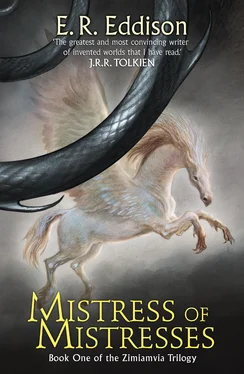The Zimiamvian trilogy inevitably has been compared with J. R. R. Tolkien’s Lord of the Rings, but apart from their narrative ambition and epic sweep, the books share little in common. (Eddison, like Tolkien, disclaimed the notion that he was writing something beyond mere story: ‘It is neither allegory nor fable but a Story to be read for its own sake’ [ The Worm Ouroboros ’ preface]. But as the reader will no doubt observe, he proves much less convincing.)
If comparisons are in order, then I suggest Eddison’s obvious influences – Homer and the Icelandic sagas – and that most controversial of Jacobean dramatists, John Webster, whose blood-spattered tales of violence and chaos (from which Eddison’s characters quote freely) saw him chastised for subverting orthodox society and religion. The shadow of Eddison may be seen, in turn, not only in the modern fiction of heroic fantasy, but also in the writings of his truest descendants, such dreamers of the dark fantastique as Stephen King (whose own epics, The Stand and The Dark Tower, read like paeans to Eddison) and Clive Barker (whose The Great and Secret Show called its chaotic forces the Iad Ouroboros ).
Eddison would have found this line of succession, like the cyclical popularity of his books, the most natural order of events: the circle, ever turning – like the worm Ouroboros, that eateth its own tail – the symbol of eternity, where ‘the end is ever at the beginning and the beginning at the end for ever more’.
Welcome to that fabled paradise, Zimiamvia: Once you have entered these words, this world, you may never leave.
DOUGLAS E. WINTER
1991
in memory of Phil Grossfield
THE UNSETTING SUNSET • AN UNKNOWN LADY BESIDE THE BIER • EASTER AT MARDALE GREEN • LESSINGHAM • LADY MARY LESSINGHAM • MEDITATION OF MORTALITY • APHRODITE OURANIA • A VISION OF ZIMIAMVIA • A PROMISE.
LET me gather my thoughts a little, sitting here alone with you for the last time, in this high western window of your castle that you built so many years ago, to overhang like a sea eagle’s eyrie the grey-walled waters of your Raftsund. We are fortunate, that this should have come about in the season of high summer, rather than on some troll-ridden night in the Arctic winter. At least, I am fortunate. For there is peace in these Arctic July nights, where the long sunset scarcely stoops beneath the horizon to kiss awake the long dawn. And on me, sitting in the deep embrasure upon your cushions of cloth of gold and your rugs of Samarkand that break the chill of the granite, something sheds peace, as those great sulphur-coloured lilies in your Ming vase shed their scent on the air. Peace; and power; indoors and out: the peace of the glassy surface of the sound with its strange midnight glory as of pale molten latoun or orichalc; and the peace of the waning moon unnaturally risen, large and pink-coloured, in the midst of the confused region betwixt sunset and sunrise, above the low slate-hued cloud-bank that fills the narrows far up the sound a little east of north, where the Trangstrómmen runs deep and still between mountain and shadowing mountain. That for power: and the Troldtinder, rearing their bare cliffs sheer from the further brink; and, away to the left of them, like pictures I have seen of your Ushba in the Caucasus, the tremendous two-eared Rulten, lifted up against the afterglow above a score of lesser spires and bastions: Rulten, that kept you and me hard at work for nineteen hours, climbing his paltry three thousand feet. Lord! And that was twenty-five years ago, when you were about the age I am today, an old man, by common reckoning; yet it taxed not me only in my prime but your own Swiss guides, to keep pace with you. The mountains; the unplumbed deeps of the Raftsund and its swinging tideways; the unearthly darkless Arctic summer night; and indoors, under the mingling of natural and artificial lights, of sunset and the windy candlelight of your seven-branched candlesticks of gold, the peace and the power of your face.
Your great Italian clock measures the silence with its ticking: ‘Another, gone! Another, gone! Another, gone!’ Commonly, I have grown to hate such tickings, hideous to an old man as the grinning memento mori at the feast. But now (perhaps the shock has deadened my feelings), I could almost cheat reason to believe there was in very truth eternity in these things: substance and everlasting life in what is more transient and unsubstantial than a mayfly, empirical, vainer than air, weak bubbles on the flux. You and your lordship here, I mean, and this castle of yours, more fantastic than Beckford’s Fonthill, and all your life that has vanished into the irrevocable past: a kind of nothingness. ‘Another, gone! Another, gone!’ Seconds, or years, or aeons of unnumbered time, what does it matter? I can well think that this hour just past of my sitting here in this silent room is as long a time, or as short, as those twenty-five years that have gone by since you and I first, on a night like this, stared at Lofotveggen across thirty miles of sea, as we rounded the Landegode and steered north into the open Westfirth.
I can see you now, if I shut my eyes; in memory I see you, staring at the Lynxfoot Wall: your kingdom to be, as I very well know you then resolved (and soon performed your resolve): that hundred miles of ridge and peak and precipice, of mountains of Alpine stature and seeming, but sunk to the neck in the Atlantic stream and so turned to islands of an unwonted fierceness, close set, so that seen from afar no breach appears nor sea-way betwixt them. So sharp cut was their outline that night, and so unimaginably nicked and jagged, against the rosy radiance to the north which was sunset and sunrise in one, that for the moment they seemed feigned mountains cut out of smoky crystal and set up against a painted sky. For a moment only; for there was the talking of the waves under our bows, and the wind in our faces, and, as time went by with still that unaltering scene before us, every now and again the flight and wild cry of a black-backed gull, to remind us that this was salt sea and open air and land ahead. And yet it was hard then to conceive that here was real land, with the common things of life and houses of men, under that bower of light where the mutations of night and day seemed to have been miraculously slowed down; as if nature had fallen entranced with her own beauty mirrored in that sheen of primrose light. Vividly, as it had been but a minute since instead of a quarter of a century, I see you standing beside me at the taffrail, with that light upon your lean and weather-beaten face, staring north with a proud, alert, and piercing look, the whole frame and posture of you alive with action and resolution and command. And I can hear the very accent of your voice in the only two things you said in all that four hours’ crossing: first, ‘The sea-board of Demonland.’ Then, an hour later, I should think, very low and dream-like, ‘This is the first sip of Eternity.’
Your voice, that all these years, forty-eight years and a month or two, since first I knew you, has had power over me as has no other thing on earth, I think. And today – But why talk of today? Either today is not, or you are not: I am not very certain which. Yesterday certainly was yours, and those five and twenty years in which you, by your genius and your riches, made of these islands a brighter Hellas. But today: it is as well, perhaps, that you have nothing to do with today. The fourteenth of July tomorrow: the date when the ultimatum expires, which this new government at Oslo sent you; the date they mean to take back their sovereign rights over Lofoten in order to reintroduce modern methods into the fisheries. I know you were prepared to use force. It may come to that yet, for your subjects who have grown up in the islands under the conditions you made for them may not give up all without a stroke. But it could only have been a catastrophe. You had not the means here to do as you did thirty-five years ago, when you conquered Paraguay: you could never have held, with your few thousand men, this bunch of islands against an industrialized country like Norway. Stir’s, ‘Shall the earth-lice be my bane, the sons of Grim Kogur?’ They would have bombed your castle from the air.
Читать дальше












